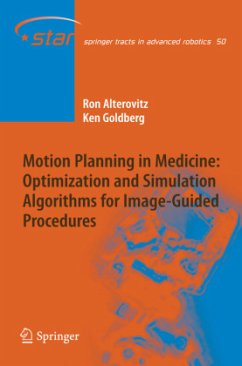The monograph written by Ron Alterovitz and Ken Goldberg combines ideas from robotics, physically-based modeling, and operations research to develop new motion planning and optimization algorithms for image-guided medical procedures. A challenge clinicians commonly face is compensating for errors caused by soft tissue deformations that occur when imaging devices or surgical tools physically contact soft tissue. A number of methods are presented which can be applied to a variety of medical procedures, from biopsies to anaesthesia injections to radiation cancer treatment. They can also be extended to address problems outside the context of medical robotics, including nonholonomic motion planning for mobile robots in field or manufacturing environments.
From the reviews:
"This monograph is intended for researchers interested in medical robotics where images are used to guide a surgical device around anatomical obstacles to reach a clinical target or attain a clinical goal. Three key algorithmic problems are addressed, compensation for deformations that may occur when surgical devices contact soft tissue, uncertainty in the response of surgical devices to command actions, and path optimization to achieve the specific goal while minimizing negative side effects." (IEEE Control Systems Magazine, Vol. 30, April, 2010)
"This monograph is intended for researchers interested in medical robotics where images are used to guide a surgical device around anatomical obstacles to reach a clinical target or attain a clinical goal. Three key algorithmic problems are addressed, compensation for deformations that may occur when surgical devices contact soft tissue, uncertainty in the response of surgical devices to command actions, and path optimization to achieve the specific goal while minimizing negative side effects." (IEEE Control Systems Magazine, Vol. 30, April, 2010)









